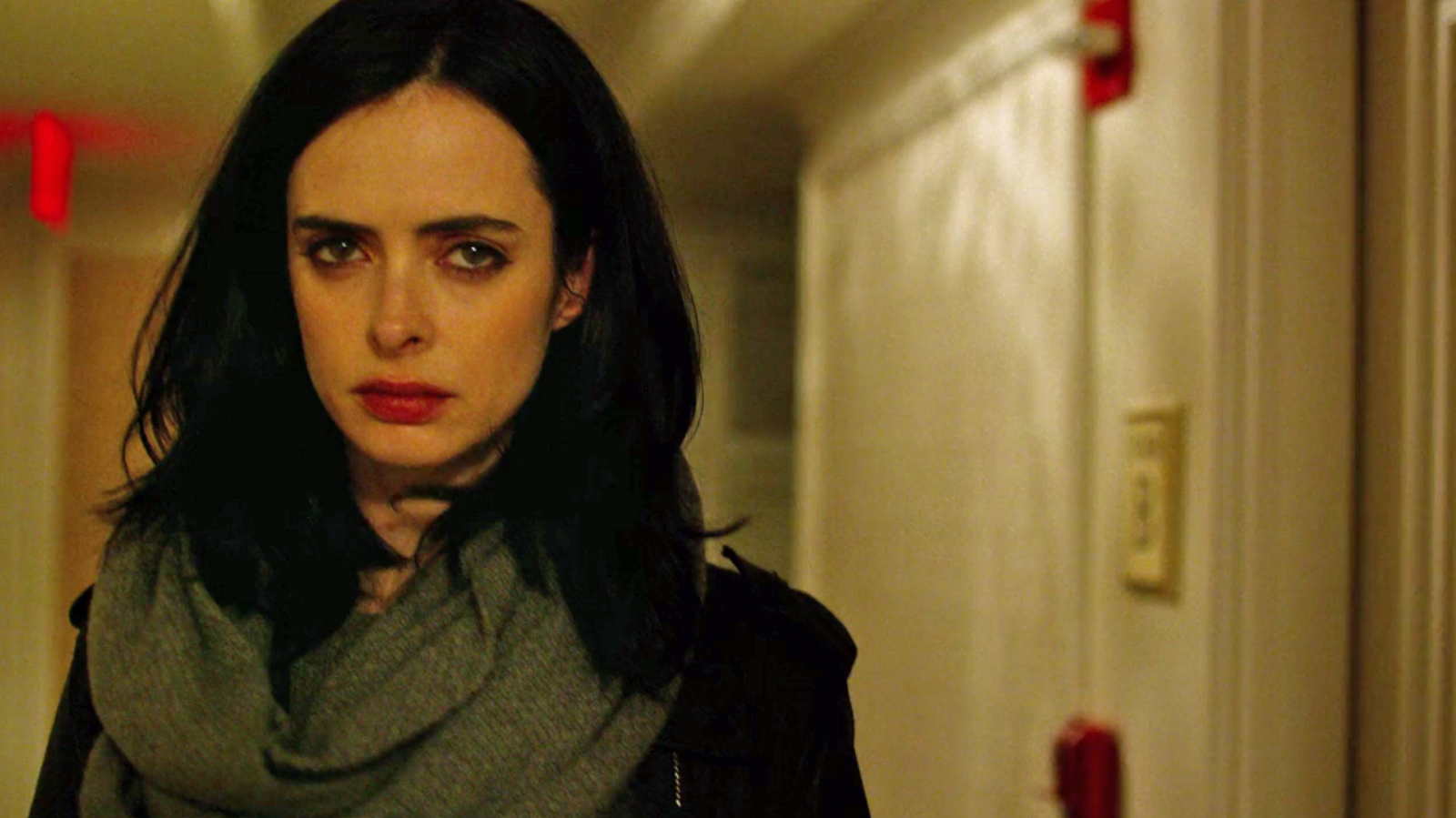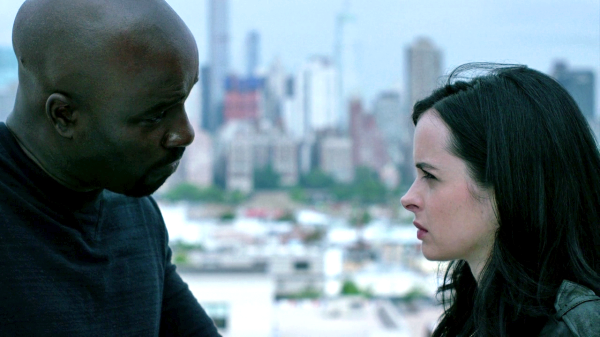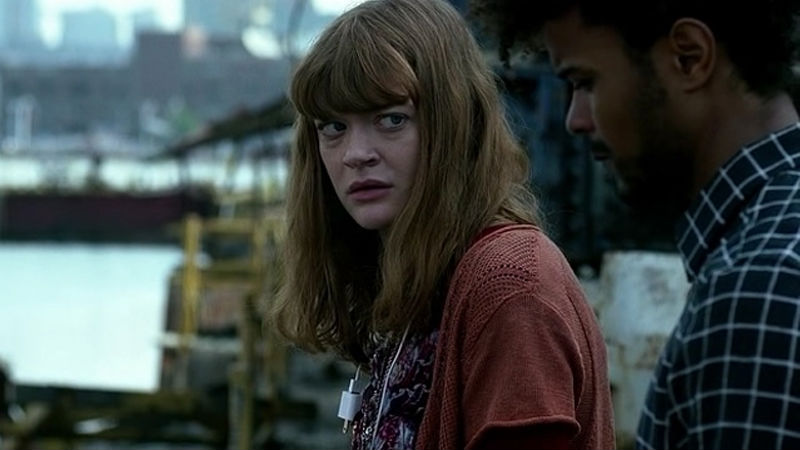"Jessica Jones," Moral Debt and Self-Contempt
 [WARNING: REALLY, REALLY SPOILERY]. Last night my wife and I finished watching Jessica Jones on Netflix. Killer writing and great performances all around. Though the show has gotten some heat from Christians for some nudity/sex scenes (see http://www.speculativefaith.com/sex-scenes-clash-with-the-art-of-jessica-jones/), and it's got some scenes of fairly bloody, grisly violence, I think there's more here that's worth consideration. And I'm not just talking about the quandry of choice in a dark world where there's often no good choices (see Julie Oom's insightful and sensitive piece for Christ and Pop Culture: http://christandpopculture.com/jessica-jones-the-hell-of-losing-control/). There's plenty of exploration of gender agency (what would it feel like to be a woman if you could out-brawn any guy you came across). And it's all set in a wonderfully noir world. From the opening credit sequence, you know you're in the world of Mike Hammer.
[WARNING: REALLY, REALLY SPOILERY]. Last night my wife and I finished watching Jessica Jones on Netflix. Killer writing and great performances all around. Though the show has gotten some heat from Christians for some nudity/sex scenes (see http://www.speculativefaith.com/sex-scenes-clash-with-the-art-of-jessica-jones/), and it's got some scenes of fairly bloody, grisly violence, I think there's more here that's worth consideration. And I'm not just talking about the quandry of choice in a dark world where there's often no good choices (see Julie Oom's insightful and sensitive piece for Christ and Pop Culture: http://christandpopculture.com/jessica-jones-the-hell-of-losing-control/). There's plenty of exploration of gender agency (what would it feel like to be a woman if you could out-brawn any guy you came across). And it's all set in a wonderfully noir world. From the opening credit sequence, you know you're in the world of Mike Hammer.
But that's not what really got my attention. What got me was that Jessica was trying to be a hero where all is debt and hope is gone (I mean, literally -- Hope dies in episode 10). She's haunted by her ability and the responsibility it thrust upon her (cue Uncle Ben's line). She's haunted by her own "sins." Under Kilgrave's mind-control she kills the beloved wife of Luke, a man she later gets sexually involved with...without telling him until much later. Luke calls her something horrible and walks away, effectively ending the relationship, and Jessica feels the isolation and guilt of her silence and cowardice.  She feels the weight of moral debt all around her. You can see it in her eyes, the way they so often seem glazed, dull, numb, dead from seeing too much.
She feels the weight of moral debt all around her. You can see it in her eyes, the way they so often seem glazed, dull, numb, dead from seeing too much.
There was one bright spot that (for a while) released her from that weight. It happened in episode 12, "Take a Bloody Number," where Luke, after falling under Kilgrave's mind-control himself, can empathize with Jessica for the first time. He tells her he realizes now he was wrong to call her that. Jessica deflects the apology: "Don't apologize; I don't want that from you."
Luke responds, "Then how about, 'I forgive you.' For everything. And I will say it every day for as long as you need to hear it."
And Jessica looks up, and that deadness in her eyes is replaced for a moment by hope. Later we find out that the words were Kilgrave's; he just told Luke what to say to get her to trust him...so that later he could kill her. It's the latest cruelty-du-jour for Jessica, but the audience feels it too. The loss, the might've beens, the hope sinking away. The episode does give a consolation prize in the form of Malcolm, another of Kilgrave's victims who in an earlier episode tried to dispose of a body of Ruben, a young man in love with Jessica whom Kilgrave made kill himself which will frame Jessica as the murderer. Ruben's sister, Robyn, is inconsolable, and hates Malcolm for his part in her loss. After watching her psychologically disintegrate over the next days and weeks, Malcolm finally takes her to the spot where
 he dumped the body in the Hudson so that Robyn can say a few words to give her closure. And there, recognizing Malcolm's compassion, she forgives him. No closure or redemption for Jessica, but a small one for her friends.
he dumped the body in the Hudson so that Robyn can say a few words to give her closure. And there, recognizing Malcolm's compassion, she forgives him. No closure or redemption for Jessica, but a small one for her friends.
It occurred to me then: the sins that Jessica struggles over she wasn't really responsible for. Not the murder of Luke's wife. The weakness of getting involved with him, sure, but the rest was Kilgrave. She's not really responsible for the other things she feels weight for -- the death of Hope, the harming of others. That's down to Kilgrave's obsession with her. She feels a moral debt mostly for stuff she didn't do. She's trapped inside a hall of mirrors where she reflects her only self-loathing back on herself, and that's alleviated only temporarily by doing something good or worthwhile. And the most worthwhile things she does (arguably) is kill Kilgrave to keep him from hurting others. She's a hero who is broken by things mostly beyond her control.
Now imagine if she actually had done something that was worthy of real shame, real guilt, something that showed that she wasn't even as good as she thought maybe sometimes she could be. A wicked betrayal. Using her strength for a thoughtless act of cruelty, something that did real damage. How would she survive that, trapped in her hermetically sealed container of self-contempt? Who in the world would have the power and moral authority to set her free, to pronounce her clean? Such a being couldn't possibly exist, could he?
Sometimes the gospel shines directly through popular culture. And sometimes it whispers its presence in its very absence. Jessica's world of fun-house mirrors of self-contempt looks a lot like what a lot of young women go through, without her super-strength to at least attempt to make things right. Jesus may seem like a really easy answer, and just coming to Jesus doesn't automatically make the self-contempt go away -- it runs really deep in some, and it takes years to get over. Still, it's there, available: "I forgive you. For everything. And I'll say it every day for as long as you need to hear it."
Recent comments
7 years 47 weeks ago
9 years 7 weeks ago
9 years 24 weeks ago
9 years 24 weeks ago
9 years 27 weeks ago
9 years 36 weeks ago
9 years 37 weeks ago
10 years 12 weeks ago
10 years 25 weeks ago
11 years 2 weeks ago